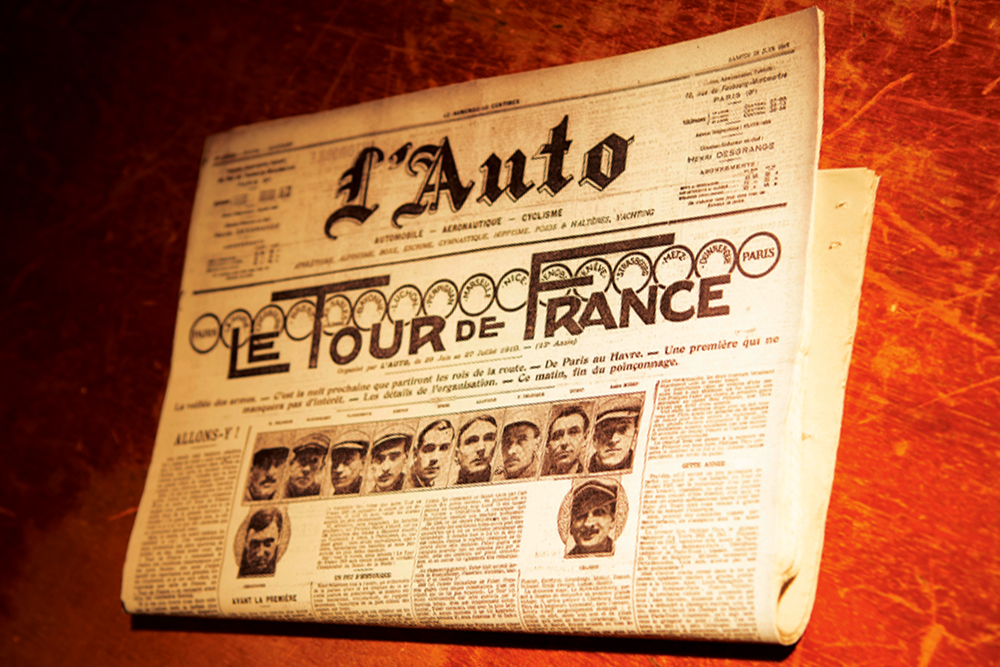Icons of cycling: L'Auto, the newspaper that launched the Tour de France
The paper that launched the Tour de France has a combative history, writes Giles Belbin

The latest race content, interviews, features, reviews and expert buying guides, direct to your inbox!
You are now subscribed
Your newsletter sign-up was successful
In the early 1900s a battle was raging on the print presses and newsstands of France. In one corner was Le Vélo, printed on green paper and edited by Pierre Giffard. In the other was L’Auto-Vélo, printed on yellow paper and edited by a former cyclist going by the name of Henri Desgrange.
Le Vélo first appeared in 1892, capitalising on the burgeoning interest in cycling. Organising its own races, it went from strength to strength throughout the 1890s and its future was seemingly secure. Then came the Dreyfus affair.
>>> Tour de France 2016 route and essential guide
In 1894 Alfred Dreyfus, a Jewish officer in the French army, was convicted of spying. France quickly divided into those who considered Dreyfus a traitor and those who thought him a victim of anti-Semitism.
Giffard supported Dreyfus and wasn’t shy about saying so, despite many of the industrialists upon whom Le Vélo relied for advertising feeling differently.
After one of his major backers, Alfred de Dion, was arrested in 1899 while demonstrating against the pardoning of Dreyfus, he and Giffard argued. De Dion pulled his advertising and set about establishing a rival paper.
Valiant efforts
Backed by a consortium put together by de Dion and edited by Desgrange, the first edition of L’Auto-Vélo was published on October 16, 1900. It proclaimed its existence a necessity of the time. “It will sing valiantly every day the glory of athletes,” it cheered.
The latest race content, interviews, features, reviews and expert buying guides, direct to your inbox!
For three years the papers traded punches with neither able to land a knockout blow. L’Auto-Vélo launched its own races, sometimes barely disguised copies of Le Vélo’s own events.
>>> Icons of cycling: The Champs-Elysées
Giffard meanwhile launched a legal challenge which forced Desgrange’s paper to drop ‘Vélo’ from its title. If Giffard thought he had at last landed a haymaker, he was wrong.
Desgrange fought back and on January 19, 1903, just three days after the enforced name change, L’Auto’s front page carried an announcement that would finally consign Le Vélo to the history books: “The Tour de France: the greatest cycle race in the world.”
A winning gamble
While Giffard was focusing on one-day races, Desgrange had taken a bold leap into the unknown and launched a race around the entire country.
It was a gamble that paid off in spades. Circulation of L’Auto soared as the hyperbolic prose of Desgrange and his team captured the super-human exploits of France’s new heroes in their daily despatches from the roadsides of France. Giffard simply couldn’t compete and the writing was on the wall. In 1904 Le Vélo finally folded.
>>> CW125 Anniversary Sportive – Cycling Weekly Sportive Series
L’Auto, empowered by owning the world’s greatest bike race, continued until 1944 when it closed during the liberation of France after cooperating with the occupying German regime. In its place came a new sports paper edited by a former L’Auto writer Jacques Goddet that thrives to this day: L’Equipe.
Jack Elton-Walters hails from the Isle of Wight, and would be quick to tell anyone that it's his favourite place to ride. He has covered a varied range of topics for Cycling Weekly, producing articles focusing on tech, professional racing and cycling culture. He moved on to work for Cyclist Magazine in 2017 where he stayed for four years until going freelance. He now returns to Cycling Weekly from time-to-time to cover racing, review cycling gear and write longer features for print and online.